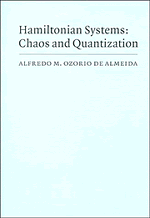Preface
Published online by Cambridge University Press: 05 July 2011
Summary
The discovery of chaotic behaviour in deterministic dynamical systems has had a profound effect in many areas of physics. There is now a large literature on this subject, which includes some important surveys. However, a physicist just entering this beautiful field or an advanced graduate student still finds the need for a concise introduction to the basic concepts in unsophisticated mathematical language. What are the essential distinctions between Hamiltonian (conservative) systems and dissipative systems? In what way will the presence of chaos in the classical limit affect a system appropriately described by quantum mechanics?
There is much to be gained by studying the theory of Hamiltonian systems against the background of general systems, in order to emphasize both contrasts and similarities. Liouville's theorem provides a remarkable distinguishing feature of Hamiltonian systems. The preservation of volume in phase space prevents the asymptotic collapse of the motion onto equilibria, periodic orbits, or ‘strange attractors’. Even though period-doubling cascades do occur in Hamiltonian systems, the loss of stability of a periodic orbit is only a local occurrence, rather than the-apocalyptic event that can subvert an entire dissipative system. In contrast the motion generated by a given Hamiltonian may exhibit diverse chaotic and regular orbits interwoven into rich structures.
- Type
- Chapter
- Information
- Hamiltonian SystemsChaos and Quantization, pp. vii - xPublisher: Cambridge University PressPrint publication year: 1989

